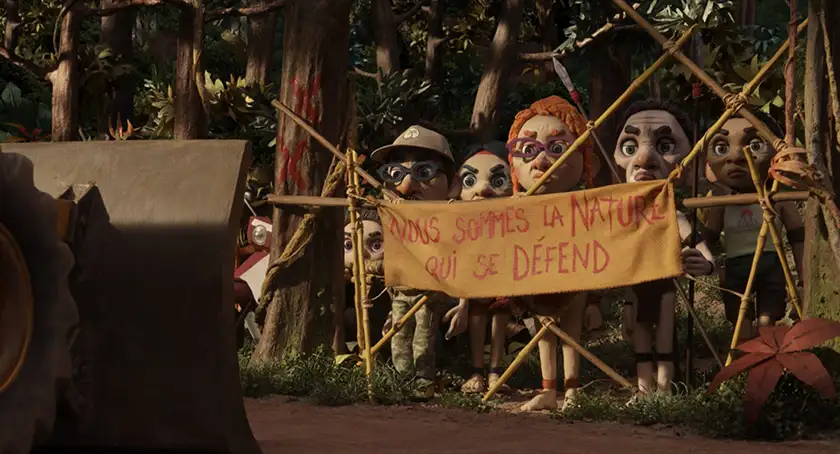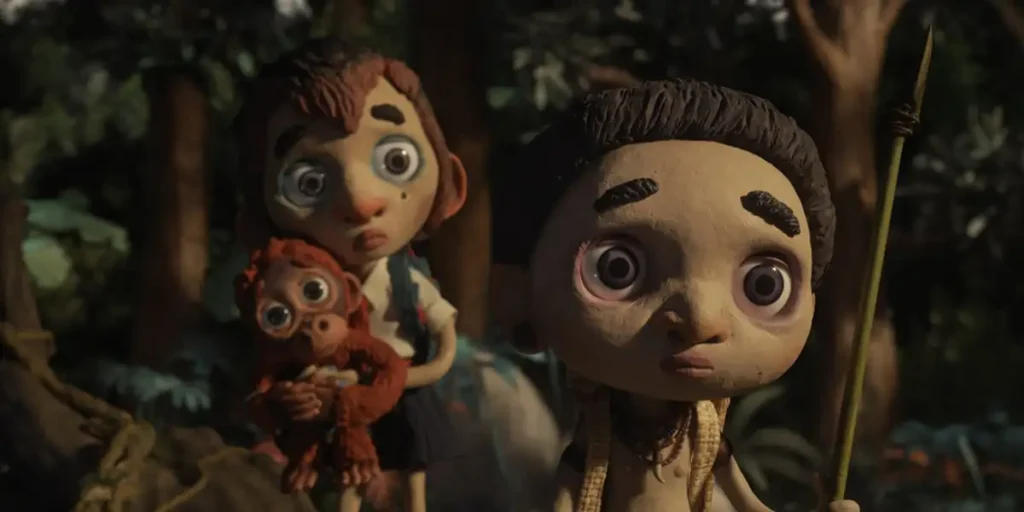Claude Barras’ environmentalist stop motion animation Savages is light on plot but is a mesmerising film to look at.
Director: Claude Barras
Genre: Stop motion, Animation
Run Time: 87′
BFI London Film Festival Screening: October 13-20, 2024
U.S. Release Date: TBA
U.K. Release Date: TBA
There is a strong anti-colonialism theme at this year’s BFI London Film Festival. It can be seen in Soundtrack to a Coup d’État, an ambitiously dense documentary about neo-colonialism in the newly-independent Congo and how Western forces conspired to grab resources from the country. Now there is Savages (Sauvages), the new film from Swiss stop-motion animator Claude Barras.
His previous work, My Life as a Courgette, was a touching story set at an orphanage that earned an Oscar nomination. With Savages, Barras turns his attention to themes of indigenous rights and environmentalism, and how both are impacted by capitalist forces. It does so with an adventure into the rainforest that isn’t as emotional as My Life As A Courgette but is still pleasantly enjoyable.
Kéria (Babette De Coster) is an 11-year-old girl living on the Southeast Asian island of Borneo. Her father (Benoît Poelvoorde, Smoking Causes Coughing) works for the ‘Green Forest Company’ as they cut down trees to build a palm oil plantation. Her late mother was part of the nomadic Penan tribe, though she has been detached from them since that tragic event. When the company’s forces shoot an orangutan dead, Kéria and her father rescue its orphaned baby from the same fate. Stuffing it into her backpack and bringing it home, she names the orangutan Oshi (after his sneeze) and is fiercely protective of him.
Meanwhile, cousin Selaï (Martin Verset) arrives to go to school and escape the conflict between his family and the company threatening their land. They are hostile to each other at first but bond when, after trying to find Oshi and the runaway Selaï, Kéria gets lost in the rainforest. With the additional help of ecologist Jeanne (Laetitia Dosch, Dog on Trial) and the tribe led by her grandfather (Pierre-Isaïe Duc), she will rediscover her heritage and join the fight to stop Green Forest. She will also learn why her father is more reticent to fight the company – and it involves what happened to her mother.
On paper, Savages has similarities to something like FernGully with its eco-friendly, ‘save the rainforest’ story in animation form. Here, Barras and co-writer Catherine Paillé focus on the human community slowly being displaced by deforestation and the capitalist reasons for it. The anti-colonialist sentiment runs through their portrayal of the greedy Green Forest Company, who make billions off the land and palm oil they take from the indigenous population. Natural annihilation in the name of progress. Moreover, the company’s evil foreman (Michel Vuillermoz, returning from Courgette) claims they have the government in their pocket and can “civilise” the Penan tribe by getting them jobs.

The film’s title may be a cruel nickname given to the tribe throughout. But it likely refers to Green Forest as savages who use violence and underhanded tactics to strip the Penan of their land rights. Conversely, they are non-violent, self-sufficient and have electricity. Kéria’s grandfather even has a phone with an ‘Eye of the Tiger’ ringtone.
As we have seen with Memoir of a Snail, well-crafted stop-motion animation can be remarkable. That is the case with Savages as well. Barras returns to the wide eyes and heads of Courgette for his human characters whilst adding amazing levels of detail to the animals. Some of them, like Oshi, are allowed to be cute and charming. Others provide a sense of danger, with bears, panthers, spiders and poisonous snakes all a part of this rainforest menagerie. Meanwhile, sound designer Charles de Ville uses noises he recorded in the Borneo jungle to further bring this environment to life. An environment surrounded by a growing city and plantation, with chainsaws and diggers (also highlighted by de Ville) chopping away at this tropical paradise.
Savages may be light on emotion and plot, but it is a mesmerising film to look at. And its simplicity is by design, allowing the maturity of its message to shine through. Right from the start of the film, where it states that “the world does not belong to us. We borrow it from our children,” Barras asks us to consider what we are doing to our natural wonders. He enforces that by centring Savages around Kéria’s personal and biological relationships, and the need for protection attached to both. On one hand, her father is trying to keep her safe after the regret of what happened to his wife. On the other, her closeness to nature is what spurs her to save this land.
And though she initially questions her tribe’s non-violent tactics, Kéria realises there are ways to spread awareness of the greedy actions of Green Forest. It is those acts of self-defence that will hopefully resonate with audiences long after seeing this film.
Savages will be screened at the BFI London Film Festival on October 13-20, 2024. Read our list of 30 movies to watch at the 2024 BFI London Film Festival!

